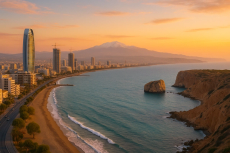
Blogs • April 18, 2025 • 20 Min
Vanuatu Visa-Free Countries: Complete List of 2025 Visa-Free & Visa on Arrival Destinations
As of 2025, Vanuatu passport holders can travel to over 96 countries without a visa, access 30+ countries with visa on arrival, and obtain eVisas in another 20+ destinations, all without setting foot in a consulate. That’s nearly 130 countries in total. The Vanuatu passport offers genuine mobility for those who value speed, minimal paperwork, and border access that actually works. It includes visa-free entry to the UK, Hong Kong, and Singapore, along with visa on arrival in countries like the Maldives, Bolivia, and Madagascar. Unlike most of its counterparts in the Caribbean or Europe, Vanuatu keeps it straightforward. There’s no global income tax, no residency requirements, and no foreign language interviews. That’s why it's on the radar of entrepreneurs, nomads, and investors looking for a plan B without the overhead. Yes, Vanuatu has seen its share of international pressure over its citizenship-by-investment (CBI) program, but in 2025, the travel access still stands strong. The passport is valid for global mobility, and it’s one of the few options that continue to deliver practical value without lifestyle trade-offs. Now let’s break down where you can actually go, with and without a visa, as a Vanuatu citizen, and how this Pacific Island nation ended up offering one of the most surprisingly flexible passports in the world. Vanuatu's Visa-Free Travel Privileges Visa-free doesn’t mean universal access, and not all visa-free agreements are equal. As of 2025, the Vanuatu passport provides short-term entry (usually up to 90 days) into 96+ countries without needing a pre-arranged visa. But the type of access varies: Some countries grant full visa-free entry at the border, with no paperwork needed. Others offer visa-free but with mandatory online registration or travel authorization (like the UK’s ETA system, rolling out gradually through 2025). Several allow entry for tourism but not for business, so using the passport to work remotely or attend client meetings may not always be legally permitted. What Does “Visa-Free” Actually Cover? Visa-free travel for Vanuatu citizens usually includes: Tourist stays: 30, 60, or 90 days depending on the country. Transit access: Ideal for international layovers and multi-country travel plans. Multiple entries per year: In many visa-free countries, you can exit and re-enter multiple times without penalty. But it doesn’t automatically include: Right to work or live long-term Permanent residency or migration pathways Free entry for dependents of other nationalities (children, spouses may have different rules) This makes the Vanuatu passport ideal for frequent short-term travelers, remote business owners, and second-home lifestyle users, not for those seeking EU residency or green card equivalents. Key Regions with Visa-Free Privileges Vanuatu’s strongest visa-free travel ties tend to cluster in: Europe (especially the Schengen Area, though currently suspended pending updates) Southeast Asia (with standout access to Singapore and Hong Kong) Oceania and the Caribbean, where diplomatic proximity or mutual recognition plays a role Vanuatu Passport Ranking and Mobility Score So, how does Vanuatu’s passport actually stack up in 2025? While it’s not in the same bracket as Japan, Germany, or Singapore, the Vanuatu passport holds a solid mid-range position when it comes to global mobility. According to data compiled from independent travel databases and government visa indexes, the Vanuatu passport currently grants visa-free or visa-on-arrival access to around 125–130 countries. Where Can You Travel with Vanuatu Passport in 2025 What This Score Actually Means A mid-tier ranking with high practical mobility: You can enter most of Asia, parts of Europe, and key destinations in Africa and South America with ease. Regional strength over global dominance: While top-tier passports like those of France or Italy offer 190+ destinations visa-free, Vanuatu offers fewer but still covers most high-traffic destinations. No visa-free access to the US, Canada, or Australia: These major economies continue to require advance visa applications, despite prior negotiations. Impact of EU Suspension A few years ago, Vanuatu citizens had visa-free access to the entire Schengen Area (26 countries). However, due to EU concerns over the integrity of Vanuatu’s CBI program, particularly the background checks on applicants, that access has been temporarily suspended since 2022. As of early 2025: Talks are ongoing, but no reinstatement has been confirmed. UK access remains open for short-term travel (via ETA as part of the UK’s new travel authorization system). Want to know how the UK’s new entry system works? Read more in our detailed guide: UK ETA Guide: What Vanuatu Passport Holders Should Know Schengen reinstatement is possible, depending on how Vanuatu adjusts its CBI protocols. This makes it critical to check entry rules before booking, some mobility privileges are still evolving. Visa-free countries for Vanuatu passport holders in 2025 Understanding Vanuatu’s Visa-Free Travel Privileges Visa-free access isn’t just about crossing borders, it’s about saving time, avoiding paperwork, and increasing mobility without constant embassy visits or surprise rejections. In 2025, Vanuatu citizens enjoy visa-free entry to over 96 countries, spanning nearly every continent. But what does that actually mean in practice? What Visa-Free Travel Really Offers Vanuatu Passport Holders Visa-free means you can enter a country without needing to apply for a visa in advance. But the benefits go beyond convenience: Immediate entry at the border: You don’t need to visit an embassy, fill out complex forms, or wait weeks for approval. Lower travel costs: No application fees, courier charges, or required documentation translates to leaner travel budgets. More spontaneous travel: Whether for last-minute business meetings or personal travel, you can move freely without logistical delays. Reputation-based access: Countries offering visa-free access are, in essence, expressing trust in your national system. While the EU has suspended visa-free access due to due diligence issues with Vanuatu's CBI program, the passport still holds weight across Asia, the Caribbean, and the Pacific. Where It Works Best Visa-free privileges are strongest in regions with cultural, economic, or geographic ties to Vanuatu: Oceania: Naturally, Vanuatu has the most relaxed entry agreements with nearby island nations. In many cases, entry is almost automatic. Southeast Asia: Countries like Singapore, Malaysia, and the Philippines have long-standing visa-free deals with Vanuatu, benefiting from regional diplomacy. Caribbean: Shared political frameworks like the Commonwealth of Nations provide open travel among small island nations. Africa and the Middle East: While less common, several African states allow Vanuatu passport holders short stays without a visa, often for tourism or transit. However, not all visa-free agreements are created equal. Things You Still Need to Watch Out for Even with visa-free access, there are a few strings attached. Here’s what Vanuatu passport holders should keep in mind: How Long Can You Stay? Stay duration for visa-free countries generally falls into three main categories: 30 Days: Common in Asia and Oceania 60 Days: Available in some African and island nations 90 Days: Seen in Eastern Europe, South America, and a few parts of Asia You can’t legally work in any of these countries under visa-free terms unless explicitly stated. Current Limitations in 2025 As of this year, Vanuatu's visa-free deal with the European Union’s Schengen Zone remains suspended. This was due to ongoing concerns regarding the due diligence standards of its Citizenship by Investment (CBI) program. While the UK still offers access, it is now switching to an ETA system (Electronic Travel Authorization), which adds an extra step. The takeaway? Visa-free access remains extremely useful, but it’s not universal. For business travelers, frequent flyers, or anyone looking to avoid paperwork headaches, the Vanuatu passport still provides considerable value in 2025. But smart planning is key, know your entry limits, track duration, and be prepared for document checks. Vanuatu Passport Ranking and Mobility Score If you’re holding a Vanuatu passport in 2025, you’ve got more global access than you might think. While it’s not in the same league as the “passport giants” like Japan or Germany, Vanuatu’s passport quietly lands in the top 60 globally when it comes to mobility. And that means something, especially if you’re using it strategically for tax planning, remote business, or backup residency. Compared to Other Small Nations Vanuatu’s ranking holds up surprisingly well among small island nations and even outperforms some Caribbean passports in practical travel scenarios. While the loss of EU Schengen access is a drawback (more on that below), the overall access, especially in Asia and Oceania, is still strong. Here’s how it compares to others in its category: Note: Rankings fluctuate based on updates from destination countries. Always check official consular advice before travel. The Schengen Suspension: What’s the Impact? Vanuatu previously enjoyed visa-free access to the Schengen Area, but this was suspended in 2022 due to EU concerns over how the country screened applicants under its Citizenship by Investment (CBI) program. As of early 2025: Schengen access is still suspended. UK travel remains visa-free (with an ETA requirement rolling out in mid-2025). Negotiations are underway between Vanuatu and the EU, but no timeline for reinstatement has been confirmed. So, while the passport still offers wide regional access, the loss of easy EU travel remains its biggest limitation at present. Who Benefits Most from This Mobility Score? The Vanuatu passport is especially practical for: Entrepreneurs who need frictionless travel across Asia, Oceania, and the Caribbean. High-net-worth individuals who want a Plan B without tax liabilities. Digital nomads avoiding bureaucratic visa processes for frequent short stays. In short, it’s not the strongest passport, but it’s an efficient tool if you know how to use Visa on Arrival Countries for Vanuatu Citizens As of 2025, over 30 countries offer visa on arrival (VoA) access to Vanuatu passport holders. This is a big deal if you travel frequently and don’t want to plan months ahead or deal with consulates. Visa on arrival means you land, go to the immigration desk, pay a small fee, and get your entry stamp, no paperwork nightmare, no advance appointments. But while convenient, it’s not always “automatic.” Some countries require documents at the border, some limit entry to certain airports, and others impose strict timelines. What You’ll Typically Need for Visa on Arrival Who Benefits Most from Visa on Arrival Access? Spontaneous travelers who book trips without long lead times Remote workers doing border runs or visa resets Citizens without permanent consular access in their home country In short, VoA doesn’t guarantee full flexibility, but it gets you through a lot of borders without advance hassle. Electronic Visa (eVisa) Requirements for Vanuatu Passport Holders Electronic visas, or eVisas, are a convenient middle ground between visa-free access and traditional embassy-issued visas. For Vanuatu passport holders in 2025, over 20 countries offer the ability to apply for a visa online, making travel smoother, faster, and less bureaucratic. You fill out a form, upload your passport, pay the fee online, and receive your visa by email. Simple. But like anything in global mobility, there are caveats you should know. What Is an eVisa? An eVisa is a government-issued travel authorization obtained online. Unlike traditional visas, you don’t need to visit a consulate or schedule an interview. Once approved, you usually receive a digital document (often a PDF) or a QR code that you present at immigration. Benefits of eVisas for Vanuatu Citizens Key Things to Watch Out For Even with the convenience of eVisas, there are a few important considerations: Exact dates of travel required: Most eVisa systems ask for fixed travel dates and may deny re-entry if they don’t match. Entry via specific airports only: Some countries (e.g., India or Turkey) only accept eVisa entry through designated ports of entry. Single vs. multiple entry: Many eVisas are single-entry, if you leave, you'll need to reapply to return. Proof of travel: Hotel bookings, return flights, and scanned passport images are often mandatory. Who Is This Ideal For? Frequent travelers who want a light, low-cost process Digital nomads and consultants needing quick access to emerging markets People living in countries without foreign embassies, no in-person visits required Countries Requiring Traditional Visa for Vanuatu Citizens Despite Vanuatu’s respectable visa-free and visa-on-arrival coverage, there are still over 60 countries where citizens must apply for a visa in advance, often through an embassy or consulate. These include some of the world’s largest economies, most visited destinations, and regions with more complex geopolitical or immigration controls. Where Do You Need a Traditional Visa? In 2025, Vanuatu passport holders must apply in advance to enter: North America United States Canada Mexico These countries maintain strict visa policies for most nationalities, and Vanuatu is no exception. Expect full embassy applications, interviews, and financial documentation. European Union (Schengen Area) France, Germany, Italy, Spain, Netherlands, and all other Schengen members The EU suspended visa-free travel for Vanuatu in 2022 due to security concerns over the country’s CBI program. As of now, Schengen access requires a short-stay (Type C) visa with an application filed through the relevant consulate. There’s no confirmed timeline for reinstatement. Australia and New Zealand While Vanuatu is part of the Pacific region, these two countries still require full visa applications, typically for both tourism and business purposes. China Entry into mainland China requires a pre-approved visa from a Chinese consulate. Hong Kong and Macau remain visa-free, but the mainland enforces stricter controls. Other Major Countries Requiring Visas Brazil, Chile, South Africa (for long stays or work) Egypt, Lebanon, Nigeria, Algeria Saudi Arabia (unless an eVisa is used under specific conditions) United Arab Emirates (if eVisa is not applicable for a specific category) What Does the Process Involve? Why These Countries Still Require Visas In most cases, it comes down to: Bilateral relations: No reciprocal agreement between Vanuatu and the destination country. Security and migration controls: Especially in high-income countries concerned with illegal immigration. CBI skepticism: Some nations view CBI-origin passports as higher risk, particularly if background checks are seen as weak. How to Plan Travel to These Countries Even though it’s more work, traveling to these destinations is entirely doable with proper preparation. Here’s what helps: Start early – Give yourself at least 4–6 weeks. Have clear ties to your home base – Proof of job, property, or family helps. Book refundable travel – In case your visa is delayed or denied. Pro Tip: If you travel frequently to visa-required countries, consider applying for a second passport from a country with broader access, or a long-term visa like a Schengen multi-entry visa valid for up to 5 years. Travel Restrictions and Special Requirements Even with visa-free, eVisa, or visa-on-arrival privileges, entry is never guaranteed. Immigration systems worldwide have evolved post-COVID, and in 2025, Vanuatu citizens may still encounter special rules at various borders. This section breaks down what to expect beyond just having the right passport. Entry Conditions and Stay Duration Visa-free entry doesn’t mean indefinite stay, and overstaying can trigger serious penalties, including fines, blacklisting, or being banned from reentry for years. Tip: Always check “days per entry” vs. “total days allowed in a year.” These are often different. Entry Refusal: When Borders Say “No” Even if you're technically allowed in, immigration officers can deny entry on the spot. This happens more often than you think, especially when travelers: Don’t have proof of onward or return flights Can’t show adequate funds Don’t have clear travel plans or accommodation Have criminal records or prior overstays What to Always Carry with You: Hotel or Airbnb booking confirmation Return flight itinerary Bank statement showing sufficient funds Travel insurance policy printout COVID vaccine certificate (if requested) Border Behavior Matters In smaller airports or lesser-known destinations, border agents sometimes go by instinct. Keeping your answers clear, direct, and consistent can help avoid unnecessary problems, even when everything else is in order. Restricted or Sensitive Destinations A few countries may still impose entry restrictions for Vanuatu citizens based on bilateral issues, sanctions, or political conditions. These are rare, but can include: Countries in conflict or under sanctions Regions with strict travel controls (e.g., North Korea) Destinations where Vanuatu doesn’t have diplomatic representation Bottom Line? Even with the right passport, always travel like you might be questioned. The smoother you make things at immigration, the fewer problems you’ll face, even in the post-COVID era. How to Get a Vanuatu Passport Through Citizenship by Investment Vanuatu remains one of the fastest and most accessible countries for acquiring second citizenship through investment. But in 2025, the landscape has changed, mainly due to international pressure, EU negotiations, and scrutiny over applicant screening. Vanuatu’s CBI program stands out as one of the most efficient options among Caribbean and island nations. Explore how it compares in our full breakdown: Best Caribbean Passport: Cost, Requirements & Benefits Let’s break it down. What Is the Vanuatu Citizenship by Investment Program? Vanuatu’s CBI program allows foreign nationals to obtain full citizenship, and a passport, by making a non-refundable financial contribution to the country’s national development fund. No residence or language requirements, no in-person interviews, and no visit to Vanuatu is necessary. How Much Does It Cost? These figures are current as of early 2025, but fees may vary slightly depending on the agent or legal partner you use. What Are the Requirements? Vanuatu’s CBI is known for minimal red tape, but there are still important eligibility rules: Is the Program Still Active Despite EU Pressure? Yes, but with tighter controls. Following the European Union's 2022 suspension of visa-free access to Schengen countries, Vanuatu made several internal adjustments: Enhanced due diligence protocols (especially for politically exposed persons) More scrutiny over applicant origins (to reduce abuse by high-risk nationals) Collaboration with international security databases (Interpol, AML watchlists) As of 2025, Vanuatu’s government is negotiating with the EU to restore visa-free access, but Schengen access remains suspended at the time of writing. What You Get with a Vanuatu Passport Full citizenship for life, including the right to pass it on to children Visa-free/visa-on-arrival access to 125+ countries No tax on global income, capital gains, inheritance, or corporate profits Dual citizenship is allowed (no need to renounce existing citizenship) Minimal bureaucracy—no residency or local investment obligations What You Don’t Get Visa-free access to the Schengen Area or USA Access to local voting rights or land ownership in some restricted areas Migration rights to Australia or New Zealand—these require separate visas Real Talk: Is It Worth It in 2025? For those looking for a quick, flexible second passport with solid regional access and low tax exposure, Vanuatu’s offer still holds strong. But it’s not a premium tier passport, and travelers focused on Europe, North America, or long-term residency elsewhere should consider it as a complementary option, not a standalone solution. Benefits of Holding a Vanuatu Passport Vanuatu may be a tiny island nation in the South Pacific, but its passport opens the door to far more than beach views and sunsets. For global citizens, entrepreneurs, and location-independent professionals, the Vanuatu passport is increasingly used as a practical mobility tool, especially when paired with a smart offshore or tax strategy. Here’s why it still matters in 2025. 1. Global Mobility to 125+ Countries Even with the suspension of Schengen access, the Vanuatu passport grants visa-free, visa-on-arrival, or eVisa entry to over 125 destinations, including: The United Kingdom Singapore and Hong Kong Russia All of Oceania Most of Southeast Asia Much of the Caribbean and Africa For business travelers, digital nomads, and frequent flyers, this level of access eliminates visa applications for a majority of common international routes. 2. Zero Global Income Tax Vanuatu remains one of the few jurisdictions in the world with no tax on global income, including: Capital gains Dividends Royalties Inheritance Personal income from offshore sources If structured properly, Vanuatu citizenship can be part of a legitimate international tax reduction strategy. 3. Fastest Citizenship by Investment Timeline Compared to other countries offering CBI, Vanuatu is still the fastest in the world: Processing in as little as 30–60 days No physical residency required No language tests or interviews This makes it ideal for those needing urgent passport solutions, for banking, emergency travel, or relocation. 4. Dual Citizenship Allowed Vanuatu recognizes dual and even multiple citizenships. You don’t have to give up your original passport to become a Vanuatu national, making it a low-risk backup plan or Plan B. 5. Lifetime Citizenship & Generational Security Once granted, Vanuatu citizenship is yours for life, and it can be passed on to future generations. This gives families long-term security in a tax-neutral jurisdiction, with travel benefits that can support global careers or relocations. 6. Simple Bureaucracy, No Residency Requirements There’s no need to: Live in Vanuatu Buy property there Start a business locally Fulfill physical presence tests The government doesn’t interfere with your lifestyle or expect you to relocate. The passport is yours to use as you see fit. 7. Useful for Offshore Banking & Business Structuring Many international banks and jurisdictions accept Vanuatu citizenship for: Opening foreign bank accounts Incorporating offshore companies Diversifying financial risk across multiple countries When combined with legal tax planning, Vanuatu citizenship becomes a useful privacy and asset protection tool. What the Vanuatu Passport Really Offers in 2025 If you're looking for a second passport that works fast, stays flexible, and doesn’t drag you into a web of residency requirements or global tax reporting, the Vanuatu passport delivers on all fronts. In 2025, its mobility profile covers over 125 countries, including major business hubs across Asia, the Caribbean, Oceania, and Africa. The no-tax-on-global-income policy makes it a powerful option for entrepreneurs, location-independent professionals, and high-net-worth individuals aiming to legally minimize their exposure. Unlike many European options, Vanuatu keeps the process light: No interviews. No language exams. No minimum stay. No hidden obligations. Of course, the loss of Schengen access remains a trade-off. But for those not dependent on EU mobility, and who value speed, simplicity, and jurisdictional freedom, it’s still one of the smartest backup passports available today. Thinking About Vanuatu Citizenship? If your priority is to diversify your options, protect your family, or set up an international life with fewer restrictions, applying through Vanuatu’s CBI program is a reliable way to make it happen, fast and legally. At Savory & Partners, we specialize in helping clients navigate this process with total clarity and confidence. From preparing your application and handling due diligence to submitting your file directly to Vanuatu’s official channels, our team ensures everything runs smoothly, securely, and on time. FAQs on Vanuatu Passport and Visa-Free Travel How many countries can I visit visa-free with a Vanuatu passport in 2025? As of 2025, Vanuatu passport holders can access approximately96 countries visa-free, along with 30+ countries offering visa on arrival, and another 20+ through eVisa, bringing the total to around 125–130 countries. Can I travel to the United States with a Vanuatu passport? No. Vanuatu is not part of the U.S. Visa Waiver Program. Citizens must apply for a B1/B2 visa at a U.S. embassy or consulate before traveling. Do Vanuatu citizens still have visa-free access to the Schengen Area? Not at the moment. As of 2025, visa-free access to the Schengen Zone is suspended due to EU concerns over the country's CBI program. Negotiations are ongoing, but reinstatement has not yet occurred. Is the Vanuatu passport useful for digital nomads? Yes. With wide visa-free access across Asia, the Caribbean, and Oceania, and no global income tax, it’s a smart choice for location-independent professionals who need travel flexibility without bureaucratic hassle. How long can I stay in visa-free countries? It depends on the country. Most allow 30 to 90 days per entry, though some offer longer stays. Always check the immigration rules before traveling to avoid overstaying. Can I live or work in another country with a Vanuatu passport? No. Visa-free access does not grant the right to live or work. It’s only for short stays (tourism, business meetings, etc.). Long-term residency or work permits must be obtained separately. What are the requirements of the Vanuatu Citizenship by Investment (CBI) Program? To obtain a Vanuatu passport through investment, applicants must fulfill a few straightforward but non-negotiable requirements. First and foremost, the program requires a non-refundable financial contribution to the country’s National Development Fund. As of 2025, the minimum amount is $130,000 for a single applicant, $150,000 for a married couple, and $180,000 for a family of four. Each additional dependent typically adds around $15,000 to the total cost. References Government of Vanuatu. (2024). Citizenship Act [CAP 112]. Retrieved from https://vancitizenship.gov.vu/images/pdf/Citizenship_Act_Cap_112.pdfHome+4Home+4Home+4 Organisation for Economic Co-operation and Development (OECD). (2024). Misuse of citizenship and residency by investment programmes. Retrieved from https://www.oecd.org/en/publications/misuse-of-citizenship-and-residency-by-investment-programmes_ae7ce5fb-en.htmlOECD United Nations Conference on Trade and Development (UNCTAD). (2024). World Investment Report 2024: Vanuatu Country Fact Sheet. Retrieved from https://unctad.org/system/files/non-official-document/wir_fs_vu_en.pdfUN Trade and Development (UNCTAD) International Monetary Fund (IMF). (2024). Vanuatu: 2024 Article IV Consultation—Press Release and Staff Report. Retrieved from https://www.imf.org/en/Publications/CR/Issues/2024/09/03/Vanuatu-2024-Article-IV-Consultation-Press-Release-and-Staff-Report-554259IMF Reuters. (2024, December 12). EU revokes Vanuatu's visa-free travel for its 'golden passport' scheme. Retrieved from https://www.reuters.com/world/eu-revokes-vanuatus-visa-free-travel-its-golden-passport-scheme-2024-12-12/Reuters
Latest Articles













PORTUGAL | RESIDENCY BY INVESTMENT
READY TO APPLY?
Citizenship enquiry

